
A Guide to Free Colorado Legislative History Materials
May/June 2025
Download This Article (.pdf)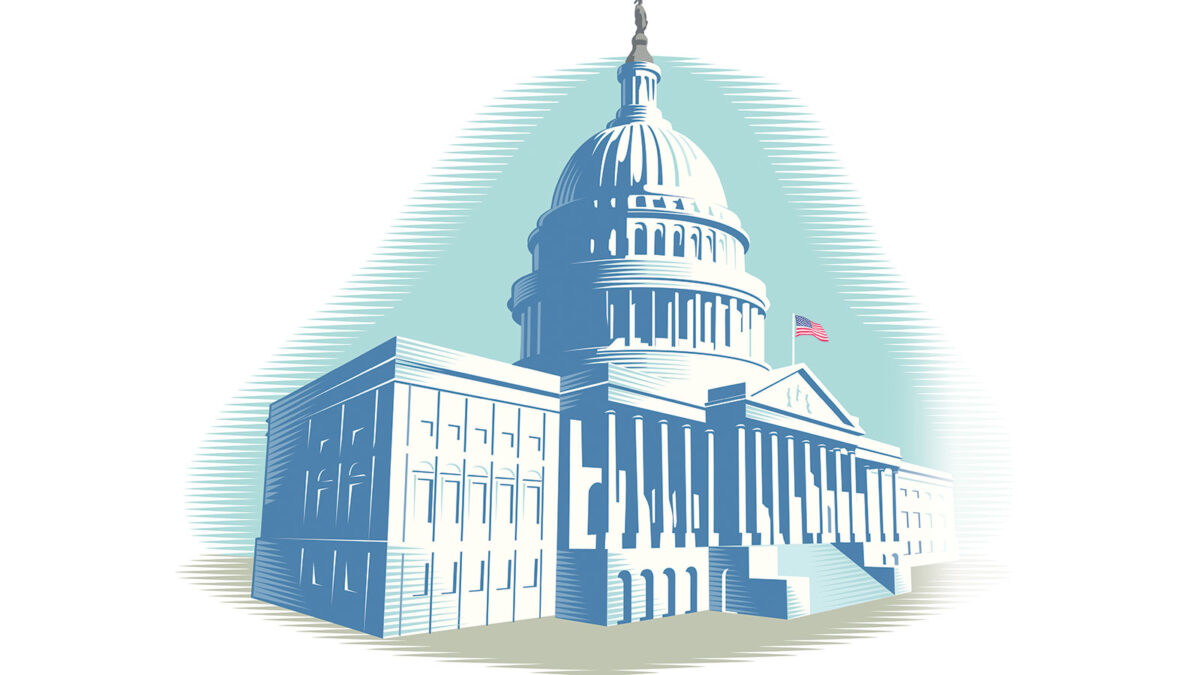
The Colorado government is a leader in transparency and availability of legislative information, but it’s easy to be overwhelmed by the amount of information available. This article serves as a guide for researching legislative history using the Colorado General Assembly website and a few other free public resources. With this guide, hopefully you’ll find it easier to locate the precise materials you need to track the substance and reasoning behind changes to the Colorado Revised Statutes.
Locating Statutory History
To begin, you’ll need to locate the statutory section you’re researching. Whether you’re using the books or an online search engine, you’ll want to look at the end of the statutory text for the historical notes. Whether this is labeled “history,” “credits,” “currentness,” “statutory notes,” or something similar, you should see a chronological list of the public acts that created and subsequently amended the section.
Throughout this article, we’ll be using CRS § 18-9-202, Colorado’s cruelty to animals statute, to illustrate each step. To locate this section online, you can access LexisNexis’s free version of the Colorado Revised Statutes via the General Assembly’s website: https://leg.colorado.gov/agencies/office-legislative-legal-services/colorado-revised-statutes. Once you pull up the statute, scroll down to locate the History section:
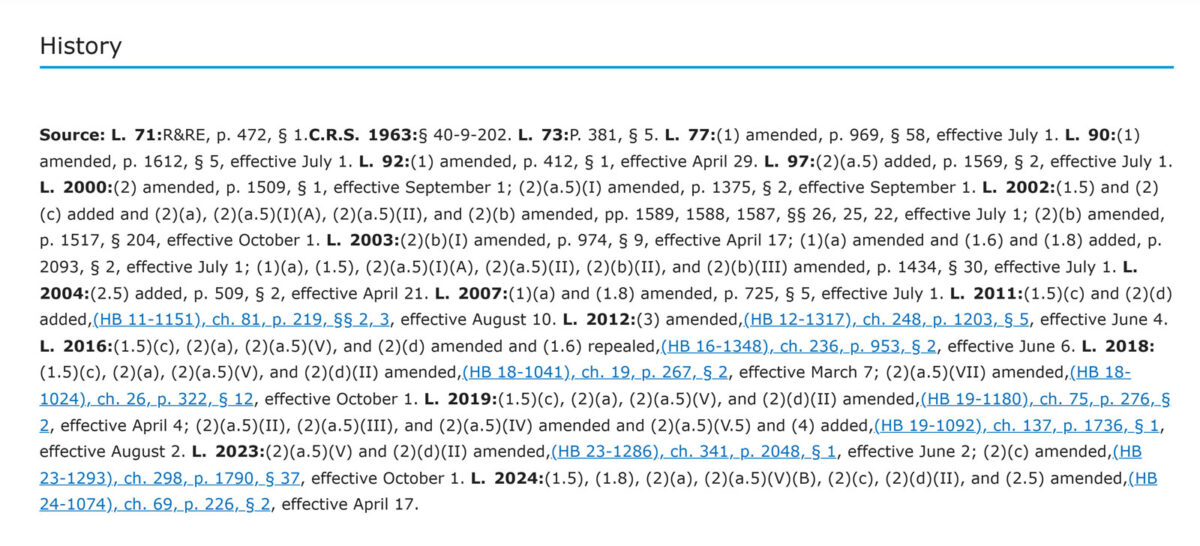
As you can see, this section has been amended multiple times in the last few years. If you know the year the changes you’re interested in were made, you can quickly locate the relevant acts. Otherwise, you’ll want to go in chronological order and see how the statute has evolved over time. The most important thing to note at this point is the public law or bill number associated with each act, because you will need one of these to access legislative history. The year the law was passed will determine how you conduct your research.
If you’re researching a law from 2016 and later and have either the public law number or bill number, you can find the law’s legislative history on the General Assembly’s website. You’ll notice in the example above that beginning in 2011, Lexis included the bill number along with the public law number.
For laws passed between 1998 and 2015, you’ll need to use the original bill number to access the General Assembly’s digital archive.1 If you only have the public law number, you can find the bill number using Scholarly Commons for the University of Colorado–Boulder.2 Rebecca Ciota has written a separate guide to for using the Scholarly Commons to locate session laws.3
Public Law Numbering
Remember that public laws have their own number separate from the bill number of the introduced legislation. Colorado public laws are published like a serial journal with a volume corresponding to the calendar year and consecutive pagination, and each enacted law has a chapter number that corresponds to its chronological order of passage. So the first public law of a particular legislative session would be [Year], chapter 1, page 1. The second act would be chapter 2, and its page number would correspond to the next page after chapter 1 completes.
The screenshot below shows how the first five public laws of 2024 appear on the Colorado General Assembly website.4

The next two sections describe how to access the full legislative history materials, depending on when the law was passed.
Legislative History for Laws From 2016 to the Present
As noted above, for laws passed between 2016 and the present, you can use the public law number or the bill number to access the legislative history on the General Assembly’s website. To begin, navigate to the main page at https://leg.colorado.gov, highlight the Laws tab, and then select Session Laws from the drop-down menu.
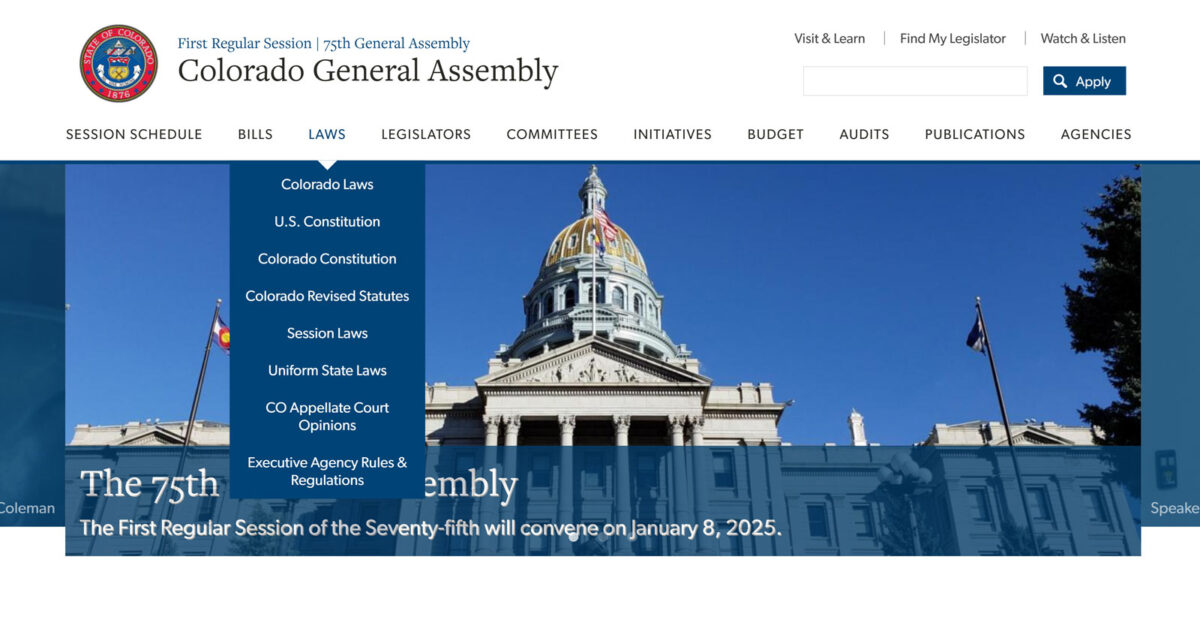
Next, you’ll need to ensure that you’re looking at the right year. On the right-hand side of the screen, you’ll have a drop-down menu to select the appropriate legislative session:
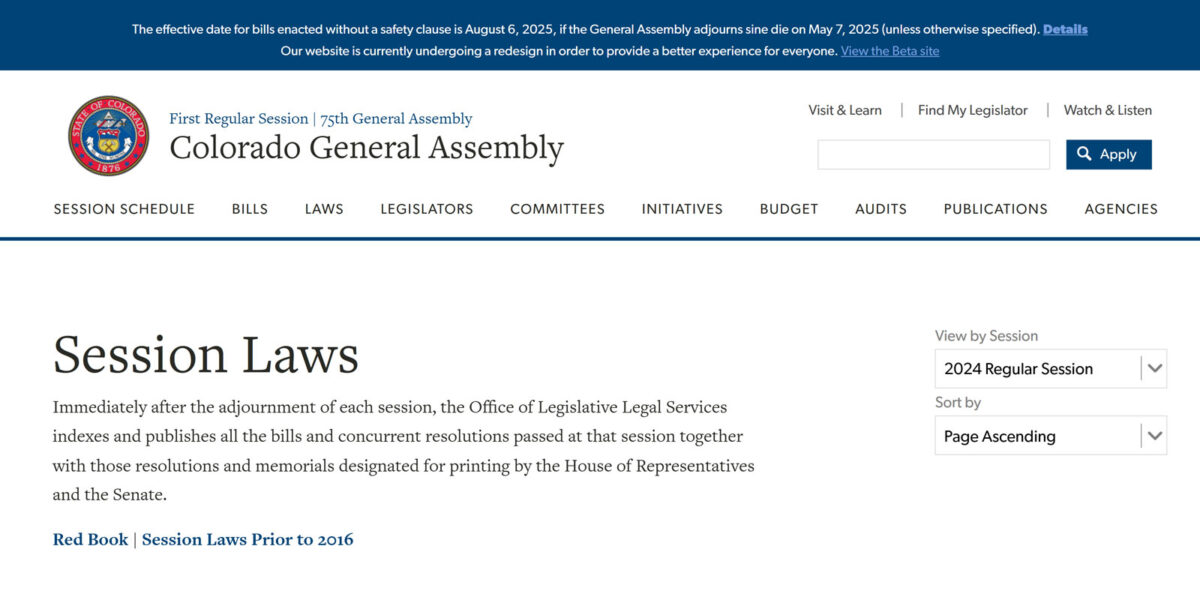
This will show you a chronological list of the laws enacted in that session. As explained above, the public law number is broken down in the “page” and “chapter” columns. If you have only the public law number, sort by page number and scroll until you find the corresponding page and chapter for the statute you’re researching. Or, if you have the bill number, sort by bill number and look for your bill on the left. For example, to locate HB 24-1074, from Colorado’s cruelty to animals statute, you would select the 2024 Regular Session, sort by Bill # Ascending, and scroll down to find the bill:
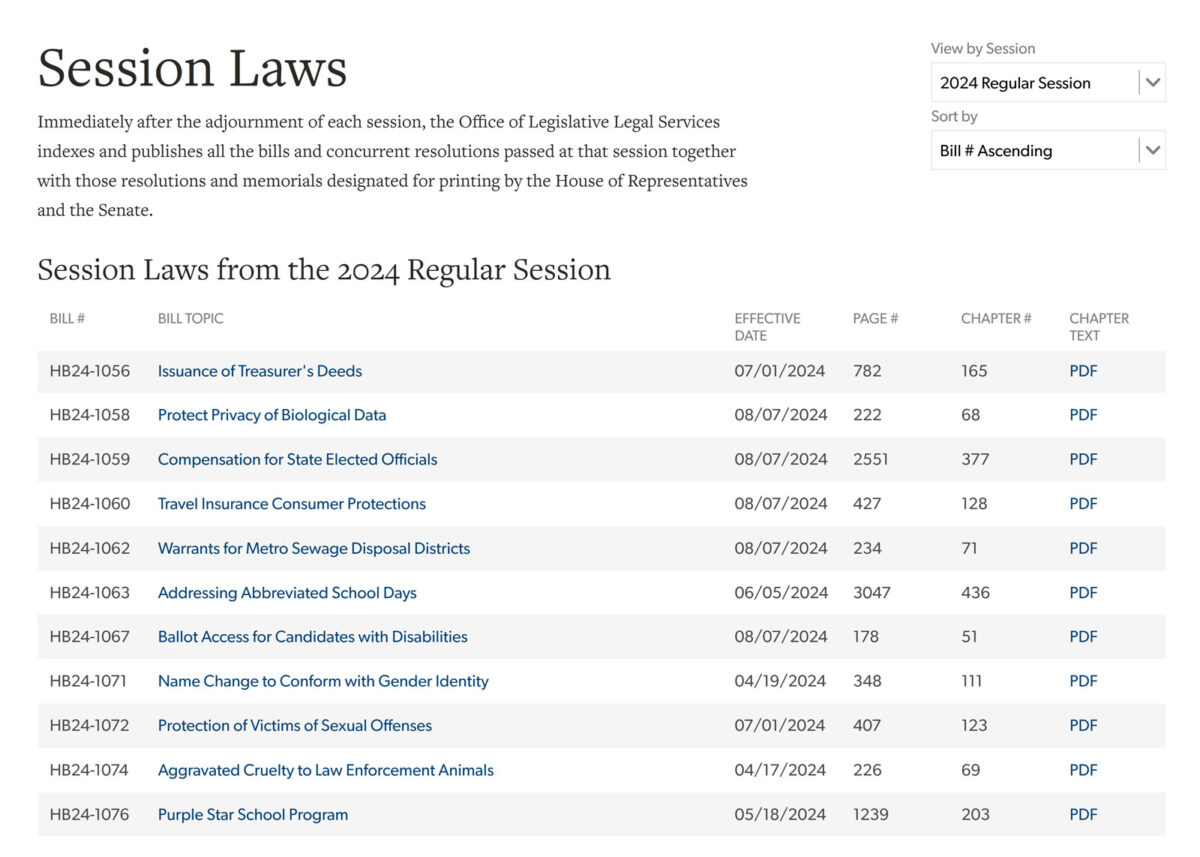
You can download a PDF of the act by clicking the link in the “chapter text” column on the right. For the full legislative history, click the bill title and go directly to the page dedicated to that bill. Here, you’ll find:
- every version of the bill from its introduction through various amendments to final passage;
- any fiscal notes attached to the bill en route to passage;
- which committee assignments the bill received, as well as committee reports and hearing summaries;
- vote tallies for the bill including how individual legislators voted; and
- copies of any amendments to the bill from its introduction to final passage.
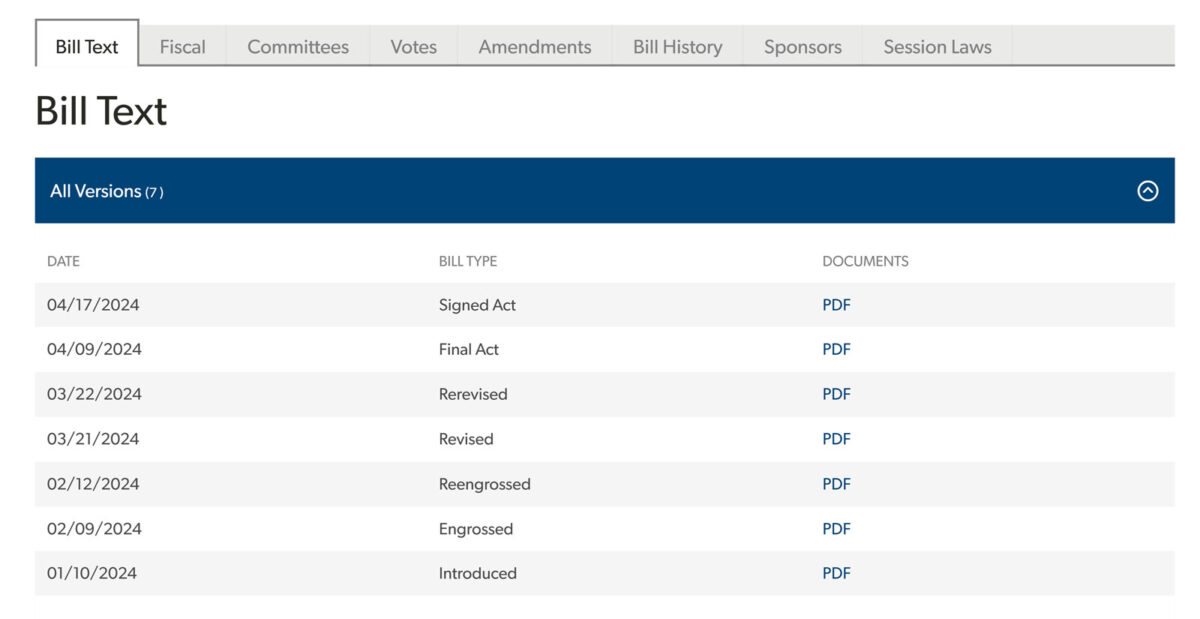
Under the committees tab, specifically, you’ll need to be mindful of where to locate the information you’re seeking. First, you’ll need to select which Senate or House committee you’re interested in; then you’ll see options to view the vote summary, the committee report, or the hearing summary.
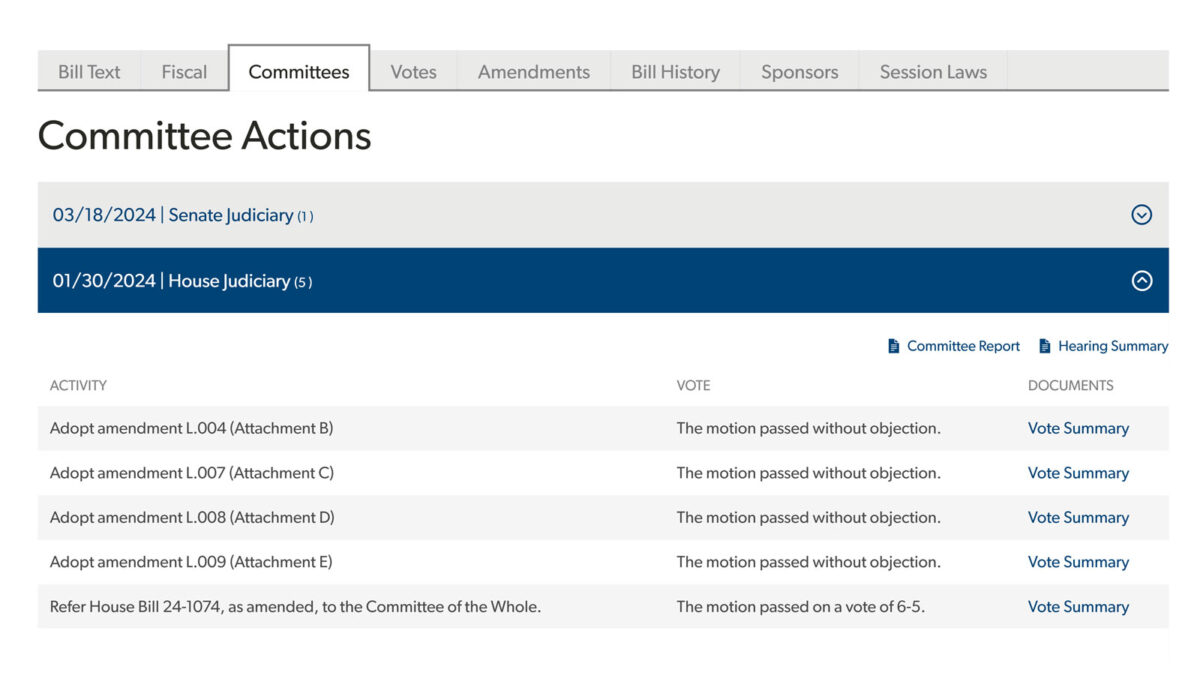
The hearing summary will contain the minutes of the meeting with time stamps.
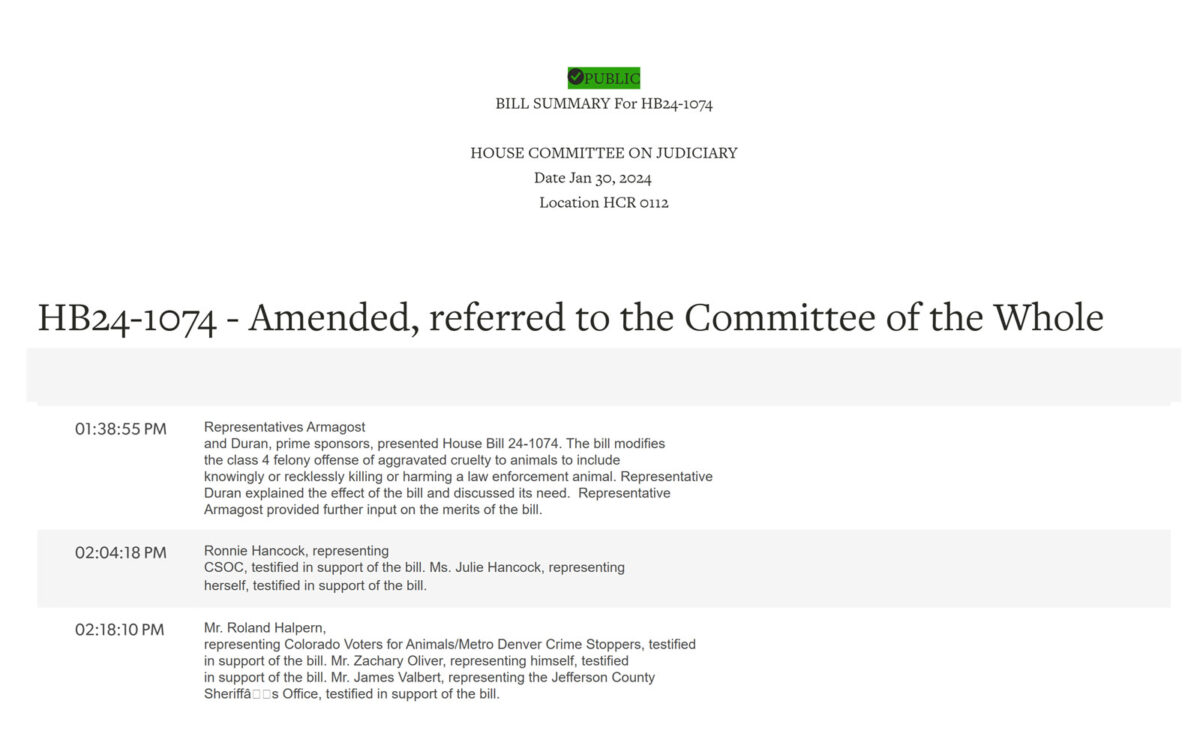
The committee’s name, bill number, hearing date, and time stamps will all be useful in locating the audio files for any recordings. Instructions for locating audio recordings, including the January 30 session shown above, are included later in this article.
Legislative History for Sessions Between 1998 and 2015
For bills passed between 1998 and 2015, once you have the bill number (using the Scholarly Commons, if necessary), go to the General Assembly’s homepage and use the Bills tab to locate the Prior Sessions archive.
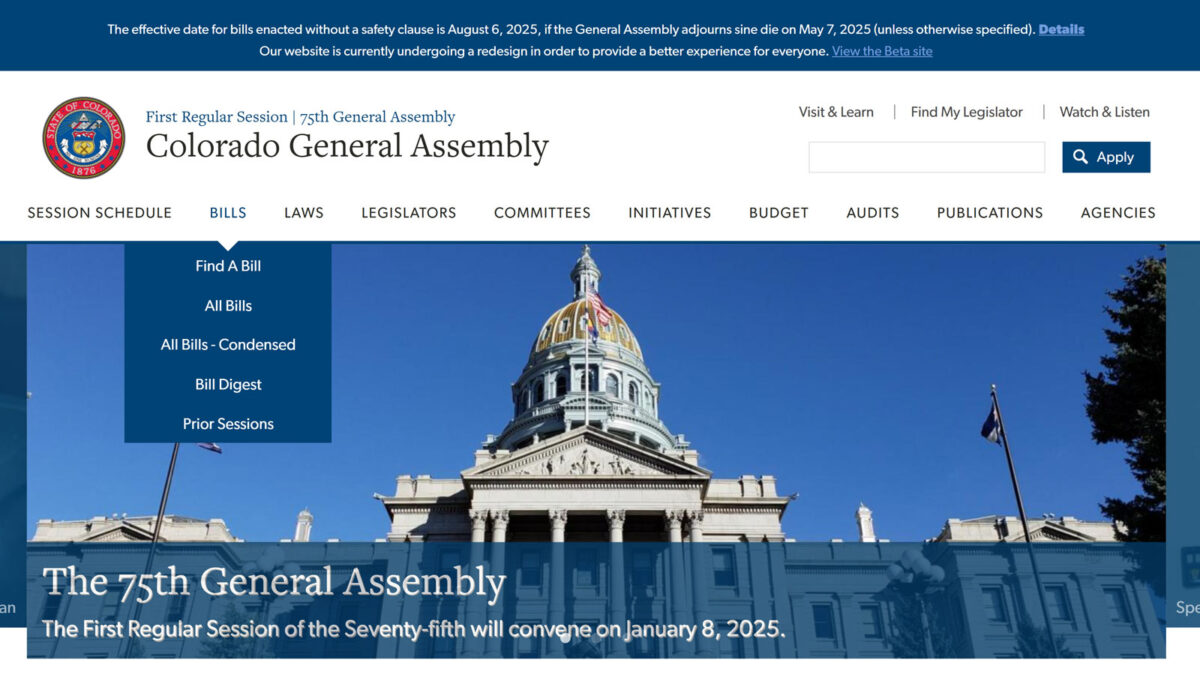
From here, select 2015 and Prior Legislative Sessions, and then access the House & Senate Bills, Resolutions, and Memorials for your bill’s corresponding year. Here, we’ll once again look to the legislative history of Colorado’s animal cruelty statute, but this time we’ll examine an earlier bill, HB 11-1151.
First, you will need to open the archive for the 2011 Regular Session’s House & Senate Bills:
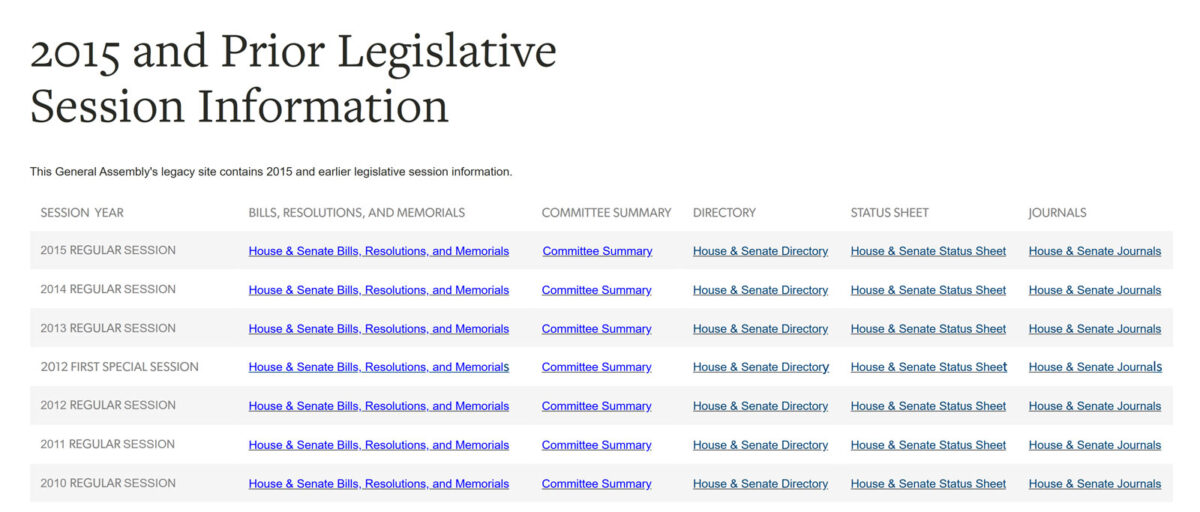
Then use the drop-down menu for Select Bill Range to select House Bills 1151-1200.
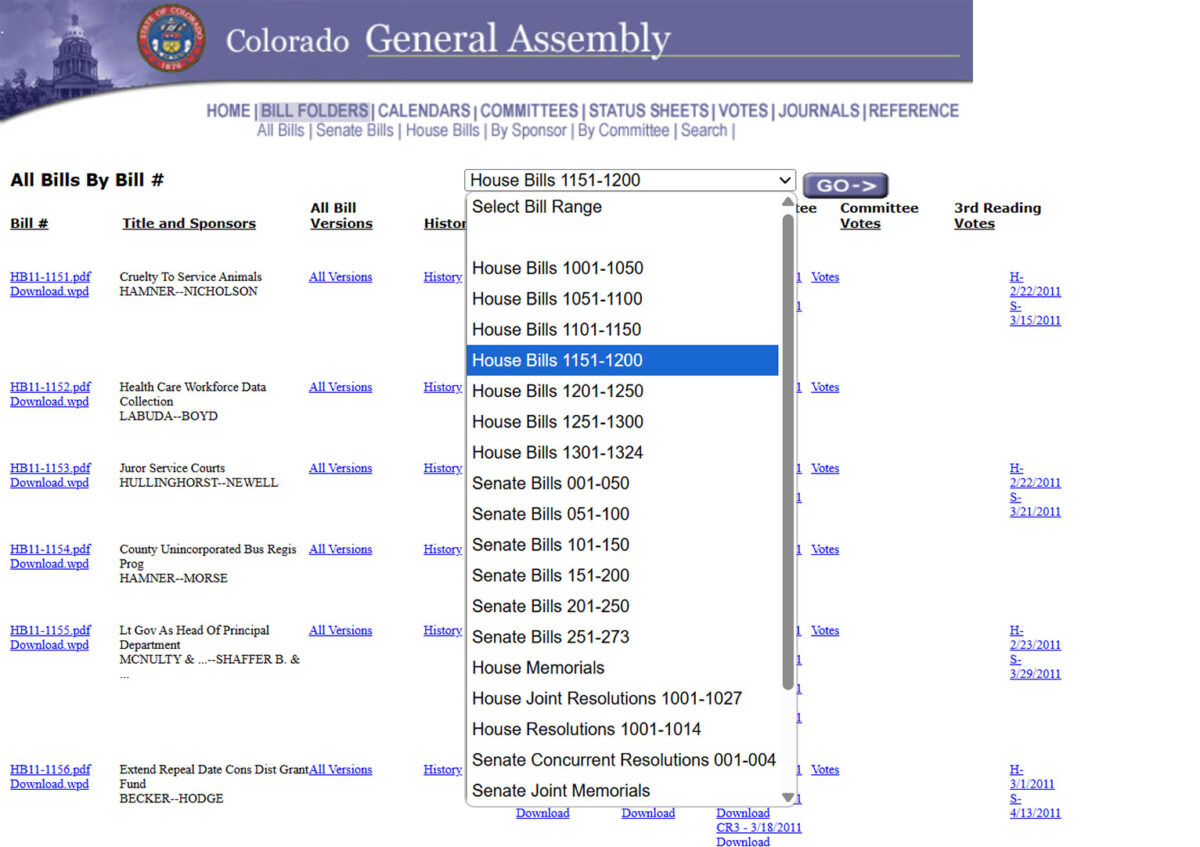
As you can see, this page has most of the same information regarding bill versions, fiscal notes, votes, and committee reports that’s available for 2016 and later sessions:
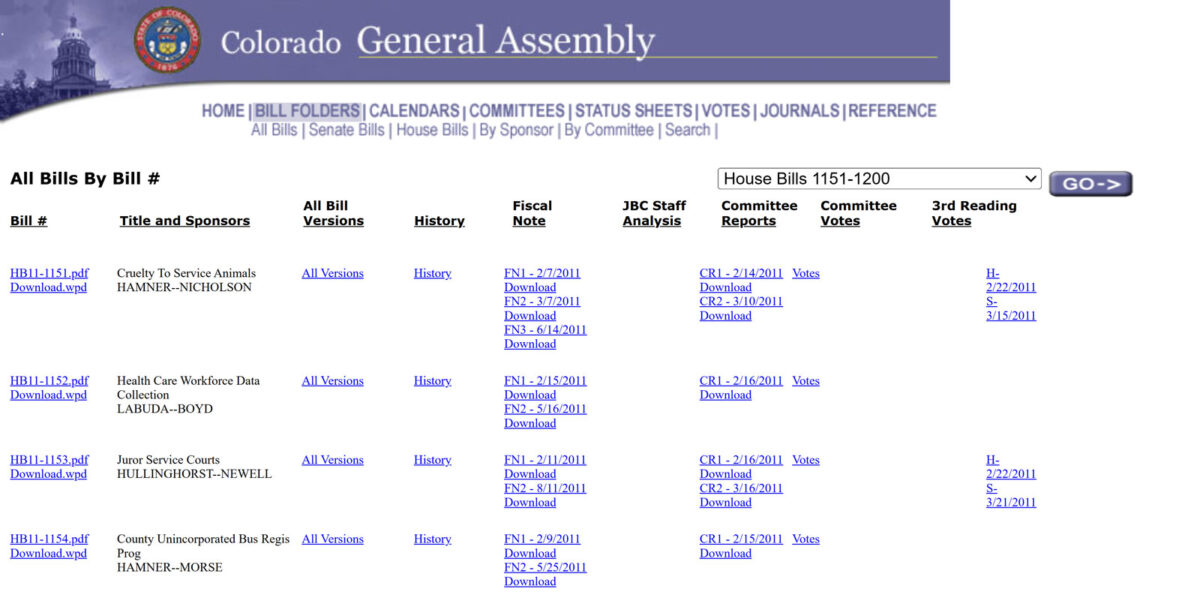
Audio Recordings
The General Assembly has recorded its floor debates and public hearings since 1973. Most of these are in the State Archives and can still be accessed with the appropriate date information; however, prior to 1973, committee reports, debate transcripts, and other materials were not routinely preserved. Colorado Legislative Council publications from 1954 to present, however, are digitized and available via the University of Denver’s Digital Commons.5
If the particular proceeding you want to listen to is from 2012 or later, it can be accessed from the General Assembly’s website using the Watch & Listen option in the upper-right corner.
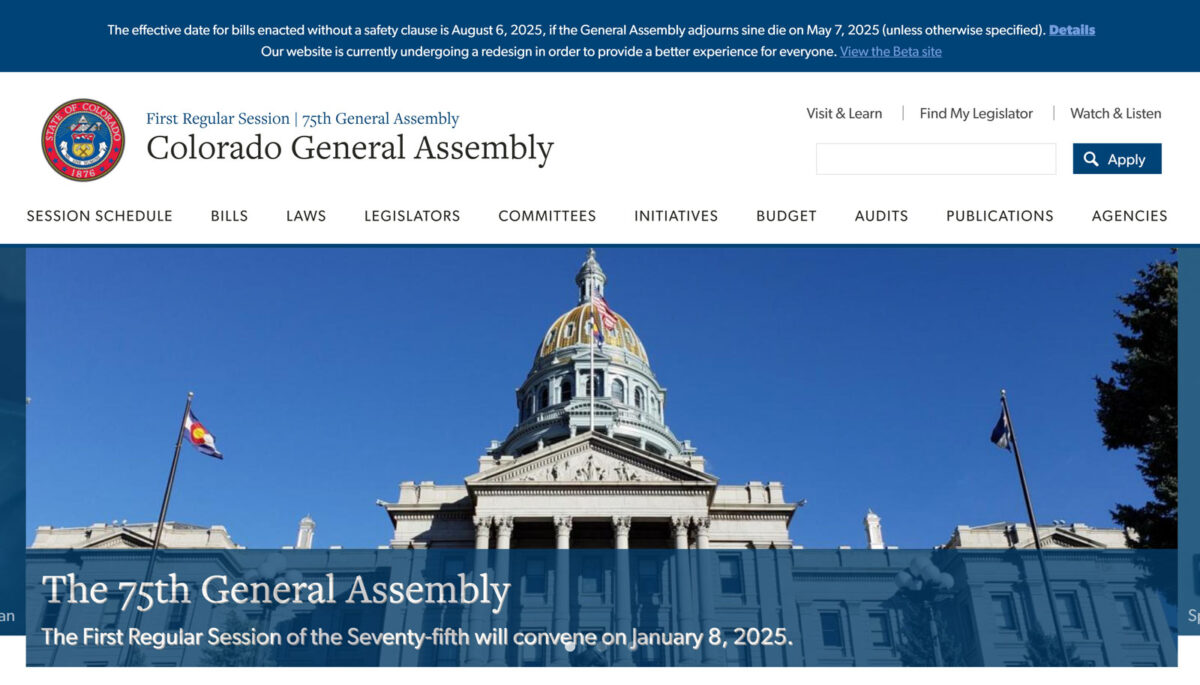
The landing page will allow you to choose which chamber’s recordings you want to access. Once you’ve selected House or Senate recordings, you’ll be taken to a page with a calendar that defaults to the current date. Use the drop-down menus on the calendar to access the date for the floor debate or committee hearing you are seeking. A list of that day’s recordings will populate with the name of the appropriate committee or floor action.
Below is a search for the January 30, 2024, House Judiciary Committee meeting from our earlier example, HB 24-1074:
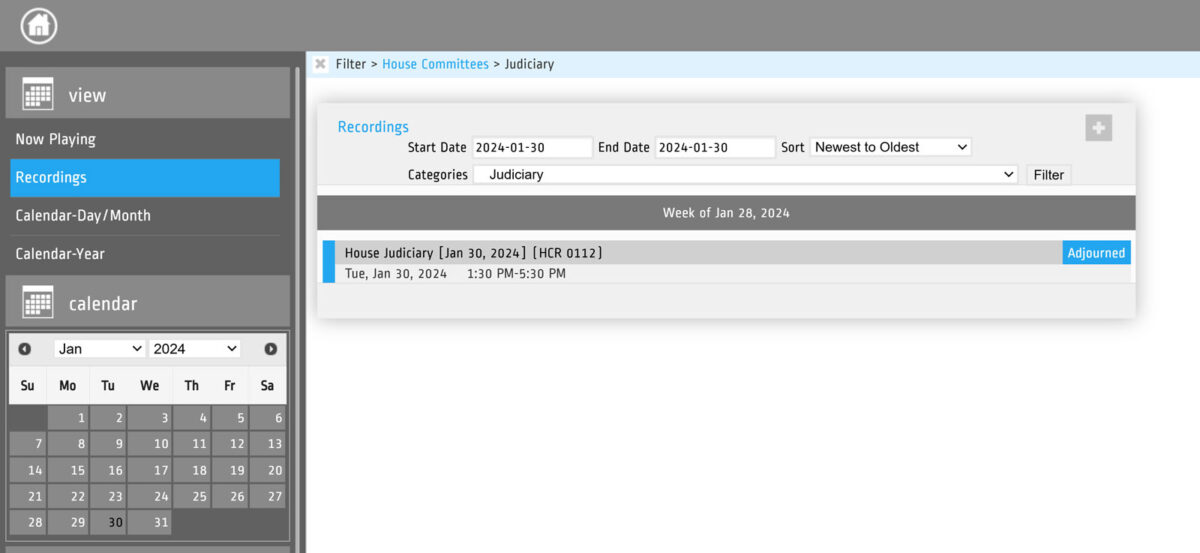
If you’re using the minutes or hearing summaries of a meeting, you can use the player to advance the recording to the portion you need.
Closing Thoughts
The past three decades have seen a significant expansion in access to legislative history materials within the state of Colorado. By following the steps above, you should be able to effectively research the history of Colorado statutes using entirely free public resources.
Notes
1. For laws passed prior to 1998, you’ll need to use print session laws and House and Senate Journals. Copies of these are kept by the University of Colorado–Boulder’s William A. Wise Law Library, https://www.colorado.edu/law-library, and the General Assembly’s Joint Legislative Library, https://leg.colorado.gov/agencies/legislative-council-staff/joint-legislative-library.
2. https://scholar.law.colorado.edu/colorado-session-laws. If the bill was passed in 2003 or later, you can also locate the bill number using the General Assembly’s Red Book archive, https://leg.colorado.gov/agencies/office-legislative-legal-services/red-book-archive.
3. https://scholar.law.colorado.edu/session-laws-2001-2050/9353.
4. https://leg.colorado.gov/session-laws.


